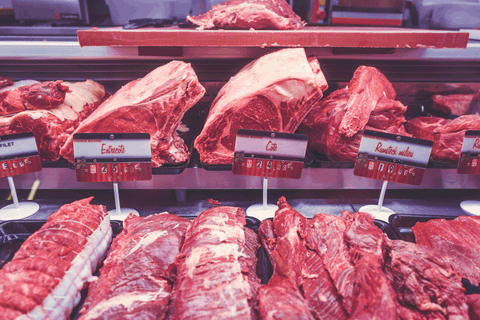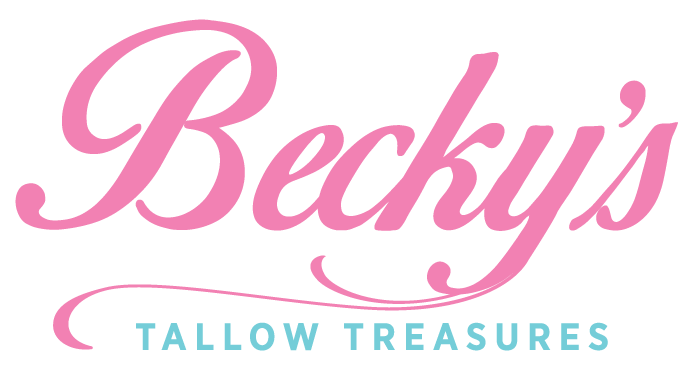
Rubbing animal fat on one's body is not in the slightest appealing, yet that is the image conjured up when I explain that my soap is made from grass fed tallow -- beef fat. The idea of "washing" with fat leaves questions like, "Won't it leave me feeling greasy?" "Won't it smell rancid?" and "Is soap really made from fat!?" I assure you, it is. And the best soap is made with animal fat. There are veggie soaps and pure olive oil soaps, but they either rapidly disintegrate in the shower or they feel slimy like snot (how's that for appealing?). We know soap isn't just a glob of fat sitting in our shower dish so lets continue.
Soap results from a chemical reaction between a fat and an alkali. Our word for soap derives from the Latin word, "sapo." Hence the process of "turning into soap" is called "saponification." Alkalies range from the more common potassium hydroxide and sodium hydroxide, to the lesser known aluminum hydroxide and sodium bicarbonate. That's right, people! Even baking soda can make a soap; although, it takes a painfully long time to finally saponify. However, each alkali has it's place. Sodium hydroxide (NaOH) is used for making solid soap, while potassium hydroxide (KOH) is used for making liquid soap. Sometimes we combine the two to manipulate the type of lather we achieve. However, soap is not the only by product of this chemical equation! In the end, we also get glycerin. This beautiful, skin-loving humectant draws moisture to your skin helping it stay plump and moisturized. Unfortunately, some manufacturers will extract this and sell it on the side for more profit. 
To clarify, I'm not using raw fat that still has all the blood, bones, and ligaments attached. The beef fat goes through a rendering process to take that raw, slab of fat and turn it into an oil. The oil, now called tallow, is cleaned of it's cracklings which are the deep fried ligaments. It's the same process which takes that fat on a strip of bacon and turns it into "bacon grease" (A.K.A. lard). Fun fact, back in grandma's day, they didn't even bother removing the cracklings before they added the lye to the mix. In fact, they would let the lye dissolve the cracklings so the end result was some ugly, brown soap.
Even though we use a caustic chemical such as lye, when calculated correctly, there is neither fat nor lye left in the final equation. However, this doesn't stop us from reminiscing about grandma's harsh soap. Back in her day, it was more of a guess. There weren't precise scales that weighed to the nearest hundredth gram. It was all done by taste testing to see if the soap still "zapped." This zap, by the way, is the bite of active lye on your tongue.
Fatty acids comprise the main structure of each fat or oil. Examples of fatty acids are lauric, myristic, stearic, and palmitic acid just to name a few. When transformed by lye, each of these fatty acids gives a different property to the soap. When some oils are saponified, they make a very stripping and drying soap. Other oils, like olive oil, seem gentle to the skin but have absolutely no lather at all.

With much room for interpretation, as a soap maker, it's both science and art to develop a truly luxurious soap. It's why not all handmade soaps are equal, yet most are more gentle than commercial detergents. With careful calculations and methodical choice of ingredients, we can craft a beautiful product that lathers well and leaves the skin soft and moisturized.
Thanks for reading!




A GOOD CRYPTO RECOVERY SYSTEM HIRE DIGITAL TECH GUARD RECOVERY
I have always considered myself financially savvy and cautious when it comes to investments. But one evening while casually scrolling through social media I stumbled upon an ad that changed everything. It featured a sleek cryptocurrency trading bot that claimed to double investments in a matter of days. The platform looked incredibly sophisticated with glowing testimonials simulated trading results and a responsive support team. It all seemed so credible. After days of contemplation and curiosity I made what I thought was a calculated decision and invested $53,000 worth of Bitcoin. At first everything appeared legitimate the interface showed steady profits charts indicated growth and I received reassuring messages from the so-called support team. I felt confident I had made the right move. Suddenly the platform froze and all communication stopped. My login credentials no longer worked and my investment vanished into thin air. That is when the horrifying reality sank in I had been scammed. The emotional impact was devastating. I felt embarrassed humiliated and deeply regretful. For days I blamed myself and hesitated to tell anyone fearing judgment and ridicule. Eventually I knew I needed help. After some research I discovered Digital Tech Guard Recovery a company specializing in crypto scam investigations and digital asset recovery. From the very first interaction their team was empathetic knowledgeable and nonjudgmental. They reassured me that many intelligent people fall for these increasingly sophisticated scams. The recovery process was not instant but it was thorough. The experts at Digital Tech Guard Recovery used blockchain forensics and analytical tools to trace my stolen Bitcoin across multiple wallets and exchanges. Thanks to their relentless dedication and expertise they managed to recover 87 percent of my lost funds. While I did not recover everything I gained something far more valuable peace of mind closure and renewed confidence. I am profoundly grateful to the entire team for treating my case with urgency and compassion. Today I share my story not out of shame but to educate others. If something promises unrealistic returns or pressures you to act fast it is likely a scam. Do your due diligence trust your instincts and do not hesitate to seek help if you have been defrauded. Thank you Digital Tech Guard Recovery for turning a nightmare into a second chance. you can reach out to them on WhatsApp https://wa.me/+14438592886